SHRI SHIVAJI SCIENCE COLLEGE, AMRAVATI
DBT STAR COLLEGE PROJECT ACTIVITY
ACTIVITY REPORT
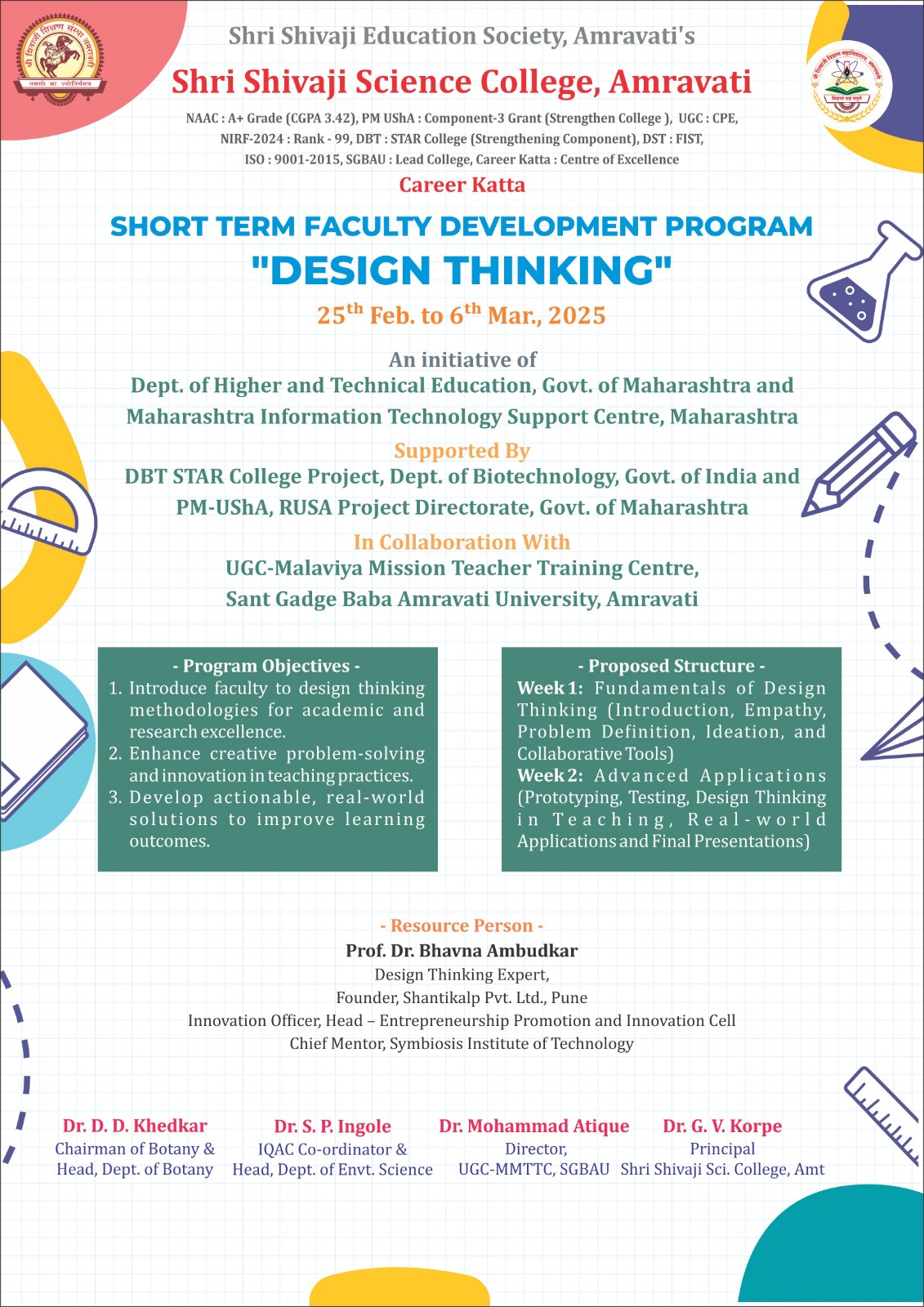
The Online Short-Term Faculty Development Program (FDP) on “Design Thinking
Activity Dates: 25 Feb. to 7 March 2025
Type of Activity: Faculty Development Program
Organizing Department: Department of Botany & Bioinformatics
Program Coordinators: Dr. D.D. Khedkar
Head of the Department: Dr. D. D. Khedkar
External Collaborator (if any): Career Katta, Maharashtra Information Technology Support Centre (MITSC) , Shri Shivaji Science College Amravati , Innovative Pedagogy Development Centre , UGC-Malaviya Mission Teacher Training Centre (UGC-MMTTIC) Sant Gadge Baba Amravati University, Amr
Objectives:
- 1. How design thinking can transform teaching methods, foster creativity, and enhance problem-solving skills in the academic environment.
- 2. Commended the collaborative effort to enhance teaching and research.
- 3. To understand historical context to highlight the evolution of design thinking over the years.
- 4. To empower educators and researchers to create meaningful and impactful solutions.
- 5. “Empathize” stage of design thinking and its vital role in enhancing the effectiveness of educators.
No of Beneficieries: 572
Classes Involved: Faculty
Venue of the Activity: Online mode
Activity Report:
REPORT
The Faculty Development Program (FDP) on Design Thinking was jointly organized by Career Katta, an initiative of the Maharashtra State Higher and Technical Education Department and the Maharashtra Information Technology Support Centre (MITSC), along with Shri Shivaji Education Society, Amravati’s Shri Shivaji Science College, Amravati. The event was held under the aegis of the Innovative Pedagogy Development Centre, with the support of the DBT STAR College Project, Department of Biotechnology, Government of India, and the PM-USHA, RUSA Project, Directorate, Government of Maharashtra, in collaboration with the UGC-Malaviya Mission Teacher Training Centre (UGC-MMTTC), Sant Gadge Baba Amravati University, Amravati.
The resource person for this FDP was the nationally recognized facilitator, Prof. Dr. Bhavna Ambudkar, Design Thinking Expert and Founder of Shantikalp Pvt. Ltd., Pune. She is also the Innovation Officer, Head of the Entrepreneurship Promotion and Innovation Cell, and Chief Mentor at the Symbiosis Institute of Technology.
The course content was designed to give participants a comprehensive understanding of design thinking. It included Design Thinking for enhanced understanding, Empathy and Problem Solving, Creative Ideation, Prototyping, and Testing with Practical Applications. The FDP was conducted in a live, interactive online mode via Zoom, streamed simultaneously on YouTube. Sessions were scheduled daily from 25th February to 7th March 2025, from 7:00 PM to 8:00 PM.
Day 1: Tuesday, 25 February 2025 – Inaugural Session
The Online Short-Term Faculty Development Program on Design Thinking began with its inaugural session from 7:00 PM to 9:00 PM, setting the tone for an intellectually rich and engaging program.
The welcome address was delivered by Mr. Yashwant Shitole, President of MITSC, who recognized the importance of technological advancement and innovative teaching methodologies in contemporary education. He warmly acknowledged the participants and stressed the value of creative approaches in pedagogy.
Following this, Dr. D. D. Khedkar, ST-FDP Coordinator from Shri Shivaji Science College, introduced the objectives of the FDP, highlighting the growing need to integrate design thinking into the teaching–learning process.
The Inaugural Address was delivered by Dr. Mohammad Atique, Director of UGC-MMTTC, who encouraged faculty to adopt student-centric, innovative approaches in teaching. In his Presidential Address, Dr. G. V. Korpe, Principal of Shri Shivaji Science College, spoke about the role of FDPs in cultivating a culture of excellence and innovation among educators, praising the collaborative effort of all organizing bodies.
Dr. R. C. Maggirwar, District and College Coordinator of Career Katta, delivered the vote of thanks, expressing gratitude to dignitaries, organizers, and participants.
The first academic session by Prof. Dr. Bhavna Ambudkar provided deep insights into applying design thinking to education, focusing on empathy, creative problem-solving, and fostering innovation in classrooms. The session was anchored smoothly by Dr. Mayura Deshmukh, Member of the Career Katta Committee.
Day 2: Wednesday, 26 February 2025
Anchored by Dr. Shruti Ingole, this session inspired participants to think beyond conventional boundaries. Drawing from global examples such as Apple’s iPhone and Airbnb, the resource person traced the historical evolution of design thinking and introduced the Five-Stage Design Thinking Process.
Real-life innovations such as the Embrace Infant Warmer and IBM Watson Health were discussed to demonstrate the process’s potential in solving real-world problems. The session emphasized its application in transforming teaching methods, encouraging creativity, and equipping educators with enhanced problem-solving skills.
Day 3: Thursday, 27 February 2025
Anchored by Dr. Rekha Maggirwar, the third day began with reflections on the previous day’s assignments, focusing on creativity in teaching and reframing research problems with a human-centered approach.
The day’s theme revolved around the “Empathize” stage of design thinking. Participants explored the distinction between empathy and sympathy, discussing how empathy helps educators understand students’ needs more effectively. Techniques for cultivating empathy were shared, followed by a hands-on empathy map activity to apply the concept in real teaching and research contexts.
Day 4: Friday, 28 February 2025
Anchored by Dr. Kavita Watane, this session was centered on a case study of IDEO, a globally acclaimed design company known for its human-centered approach. Participants learned how IDEO’s methods could be applied to education.
Key highlights included the use of the “How might we…” framing technique to convert challenges into opportunities and the introduction of Journey Mapping to visualize student experiences and identify areas for improvement.
Day 5: Saturday, 1 March 2025
Hosted by Dr. D. D. Khedkar, this session reviewed assignments from Day 4, where participants mapped student journeys by analyzing stages, actions, emotions, pain points, and improvement opportunities.
The session advanced into the Ideation stage of design thinking, where Dr. Bhavna Ambudkar explained techniques such as Brainstorming, Mind Mapping, SCAMPER, and Critical Thinking. Participants were encouraged to develop eight innovative ideas for evaluating answer sheets as part of their assignment.
Day 6: Monday, 3 March 2025
Anchored by Dr. Suvarna Mankar, the sixth day began with a culturally engaging question: “What do you call design thinking in Marathi?” This led into a discussion on Prototyping, covering definitions, purposes, types (low- and high-fidelity), and real-world examples.
The iterative mantra “Fail fast, learn quickly, and refine” was emphasized, encouraging participants to embrace experimentation. The session ended with a motivational song by Dr. D. D. Khedkar, “गुरु गरिमा के पोशाक है, हम पीढ़ी के निर्माता हैं,” leaving a lasting emotional impact.
Day 7: Tuesday, 4 March 2025
Anchored by Dr. V. V. Deshmukh, this session revisited the previous assignment comparing low- and high-fidelity prototypes. Participants also presented prototypes developed by themselves and their students.
The focus was on the Testing and Iteration phase, covering the role of feedback, A/B Testing, Usability Testing, and iterative refinement. Educators discussed applying these methods to improve teaching strategies.
Day 8: Wednesday, 5 March 2025
Led by Dr. U. S. Junghare, the session began with a recap of Day 7 and moved into exploring Integrating Design Thinking into Teaching Pedagogy and Curriculum Design.
Participants learned strategies such as Flipped Classrooms, Gamification, and Enquiry-Based Learning. A reflective activity concluded the session, allowing educators to share how design thinking had reshaped their teaching approaches. Dr. Kavita Gawande delivered the vote of thanks.
Day 9: Wednesday, 5 March 2025
This session opened with soothing background music by Dr. D. D. Khedkar. Dr. Bhavna Ambudkar continued her lecture, revisiting the integration of design thinking in teaching pedagogy and its benefits, including enhanced engagement, industry relevance, and fostering innovation and entrepreneurship.
Participants were again introduced to flipped classroom methods, gamification, and given the assignment of designing a lesson plan using six prescribed steps. The session concluded with reflective discussions on the transformative effect of design thinking in education.
Day 10: Thursday, 6 March 2025
On the final day of lectures, Dr. Bhavna Ambudkar addressed Research and Innovation through Design Thinking. She explained the necessity of applying design thinking in research, particularly for fostering cross-disciplinary collaborations—highlighting multidisciplinary, interdisciplinary, and transdisciplinary approaches.
The day concluded with a vote of thanks to Principal Dr. G. V. Korpe, Dr. Bhavna Ambudkar, Dr. D. D. Khedkar, Dr. Mohammad Atique, and Dr. R. C. Maggirwar, followed by announcements regarding the valedictory function and the upcoming test.
Conclusion
This ten-day Faculty Development Program successfully blended theoretical insights with practical applications, enabling participants to explore every stage of the design thinking process—from empathizing with learners to ideating, prototyping, testing, and integrating innovative practices into both teaching and research.
With active participation from over 300 educators, the FDP not only enriched professional knowledge but also inspired a renewed commitment to creating engaging, human-centered learning environments. The collaborative effort of multiple institutions, the expertise of Prof. Dr. Bhavna Ambudkar, and the dedicated coordination of the organizing committee ensured that this program left a lasting impact on all attendees.
Outcomes:
- 1. Design Thinking workshop enhanced understanding, Empathy and Problem Solving, Creative Ideation, Prototyping and Testing with Practical applications.
- 2. This workshop highlighted the impact of FDPs in nurturing a culture of excellence and innovation among educators.
- 3. Nurture a culture of excellence and innovation among educators.
- 4. It emphasized the transformative potential of design thinking in educational practices and inspired educators to adopt more innovative, student-focused methodologies.
- 5. Effective strategies for problem definition and solution, including Brainstorming, Mind Mapping, SCAMPER, and Critical Thinking.
Photos:
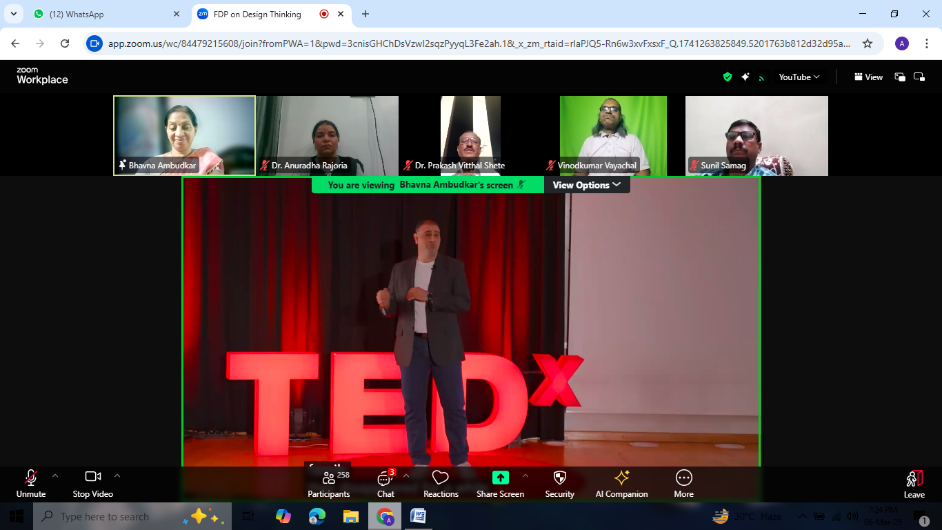 Presentation by Prof. Ambudkar Madam | 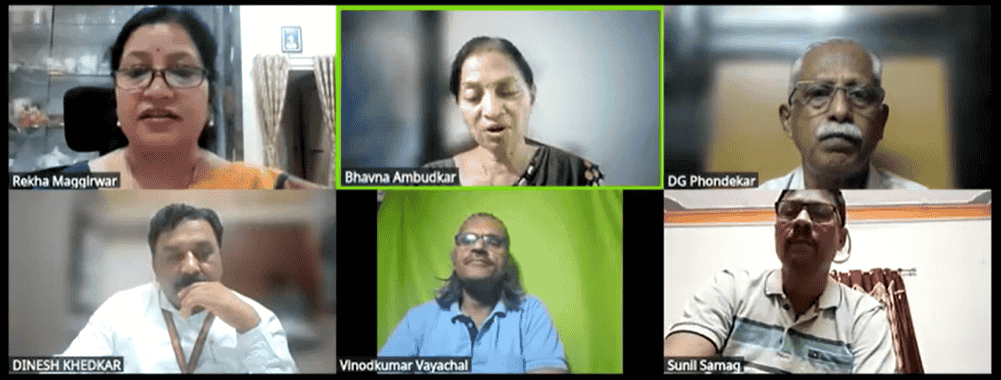 Participants with Prof. Ambudkar Madam |
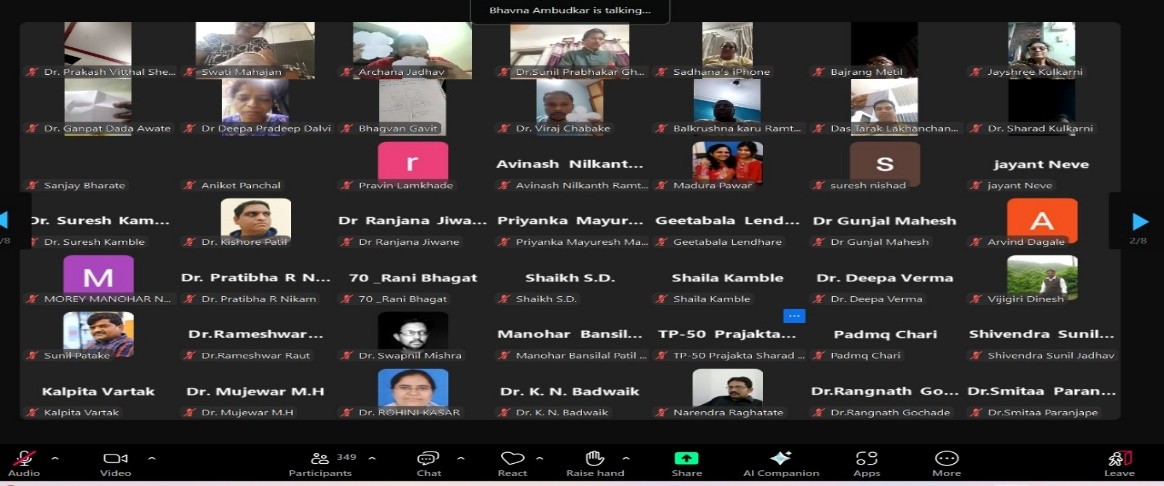 Participants photo 1 | 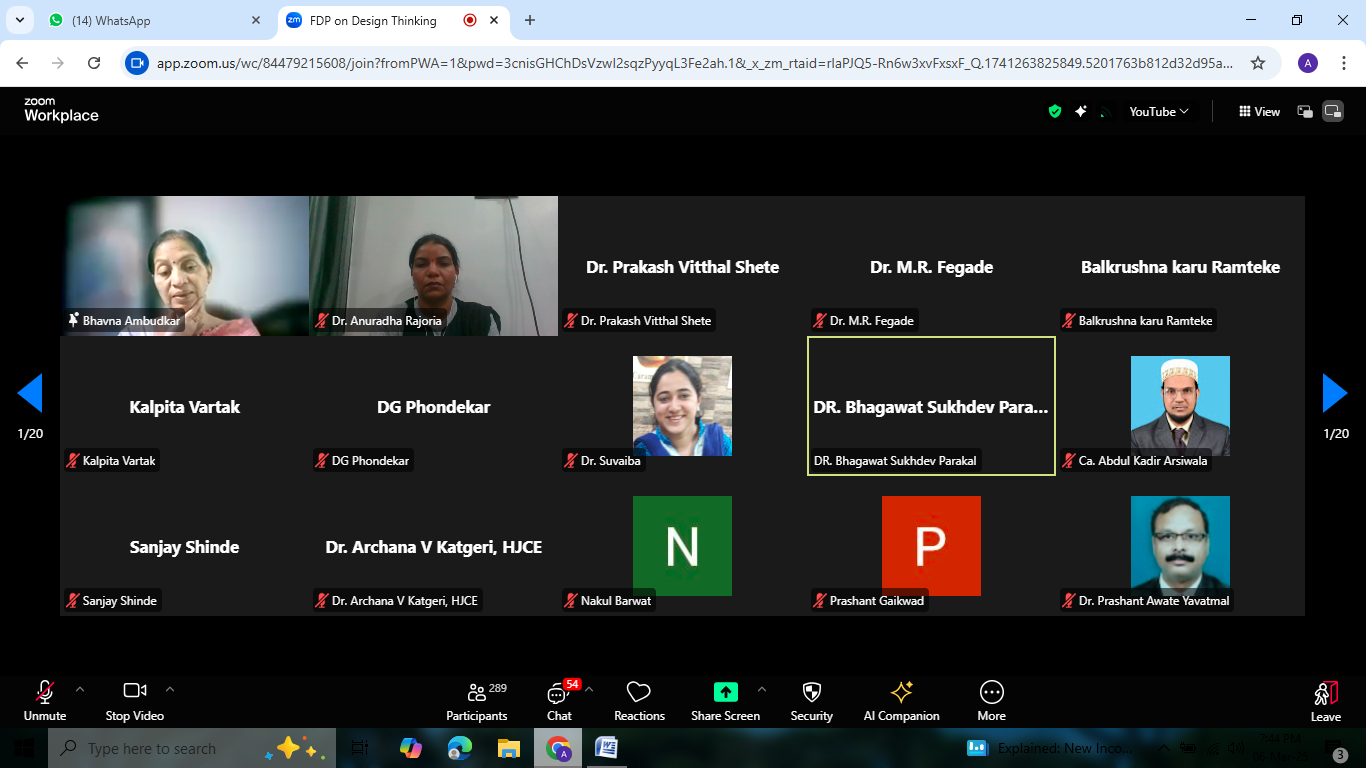 Partcipants photo 2 |
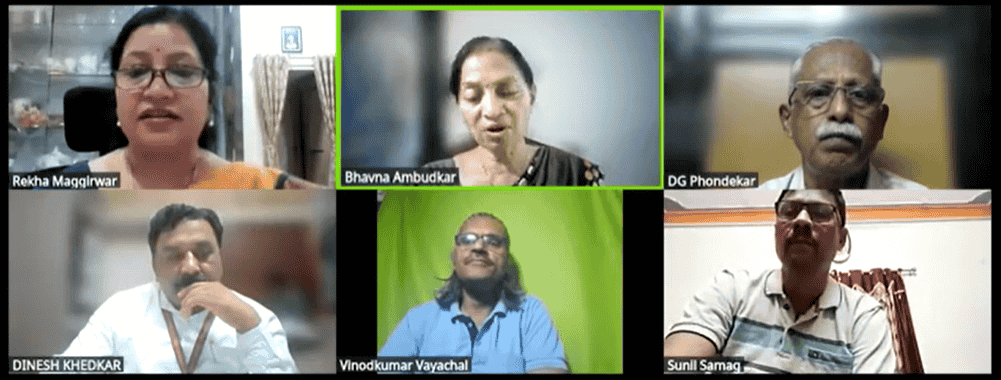 participasnts | 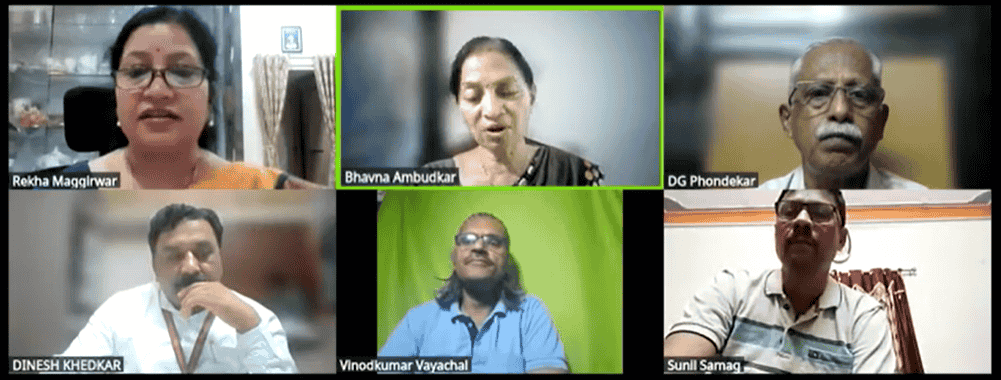 expert Dr. Prof. Ambudkar Madam |
Attendance Sheet:
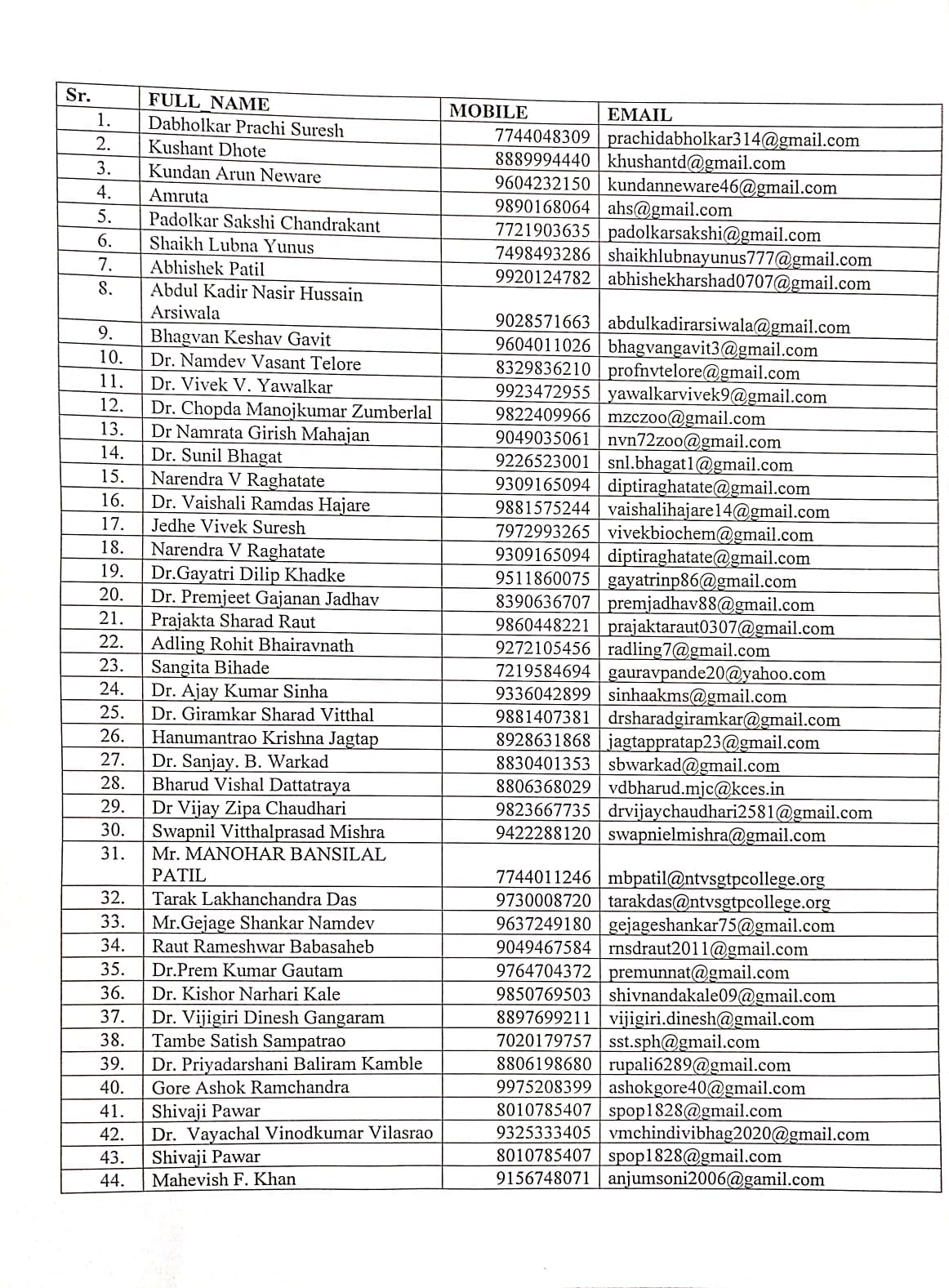 |
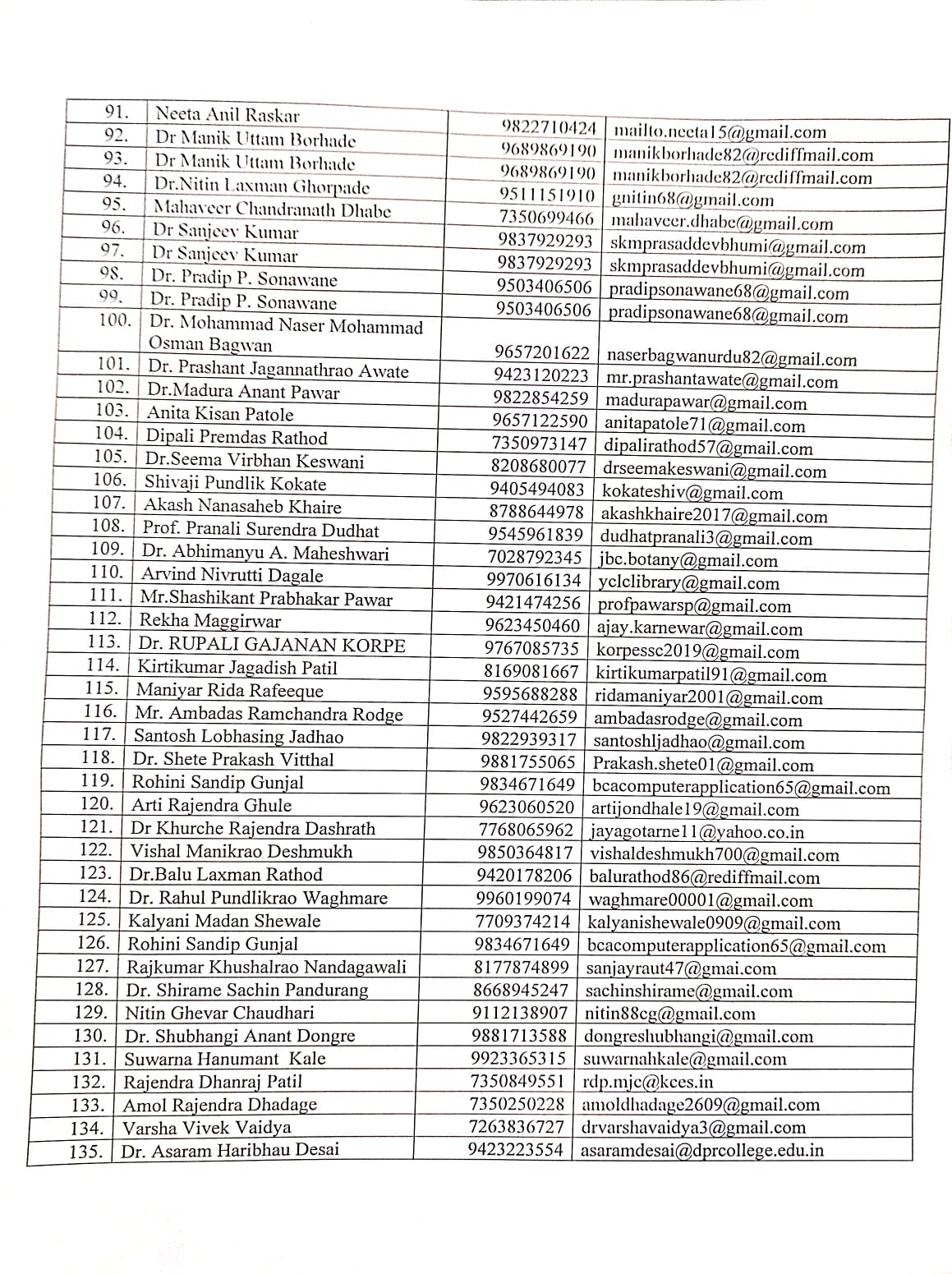 |
 |
 |
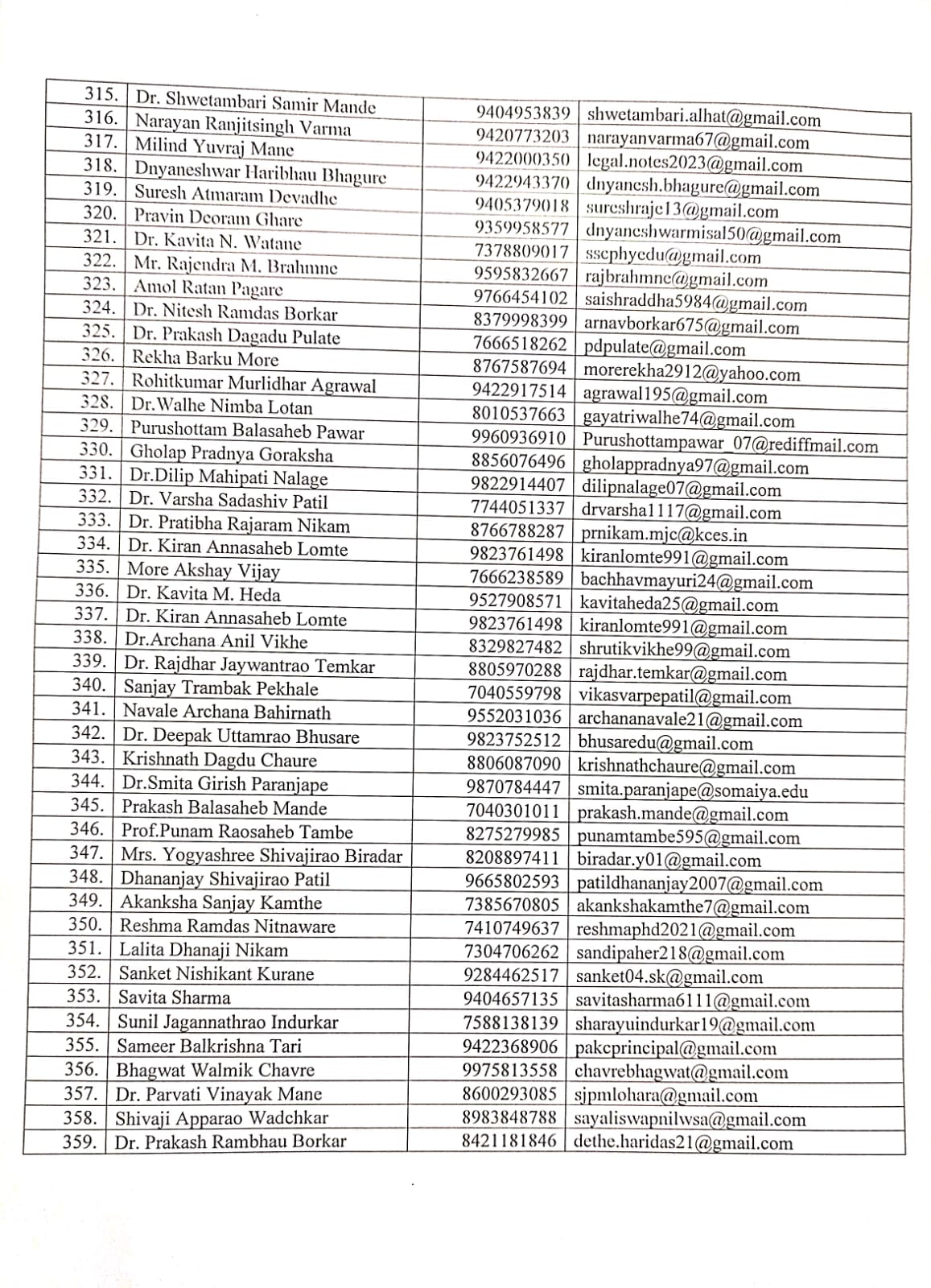 |
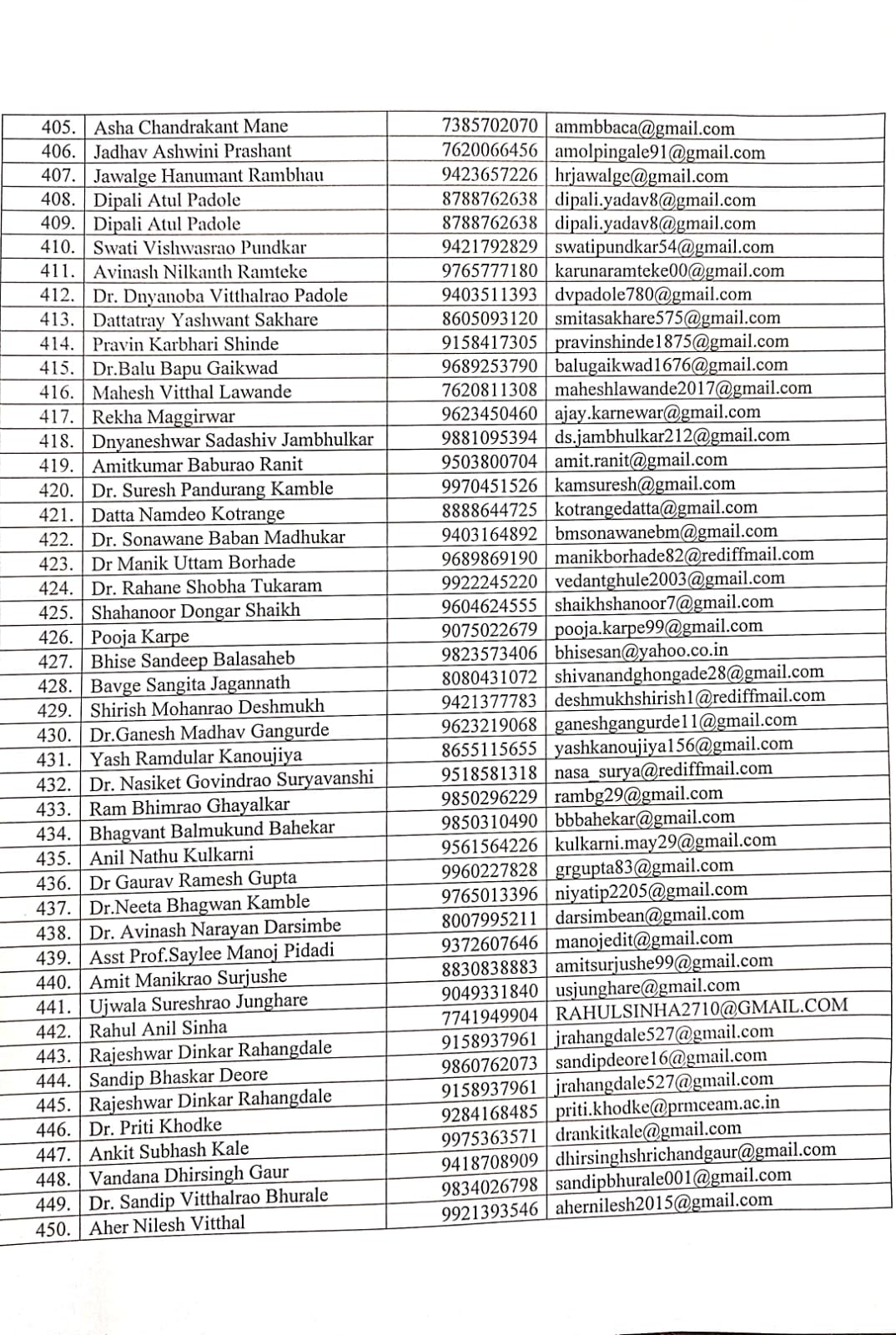 |
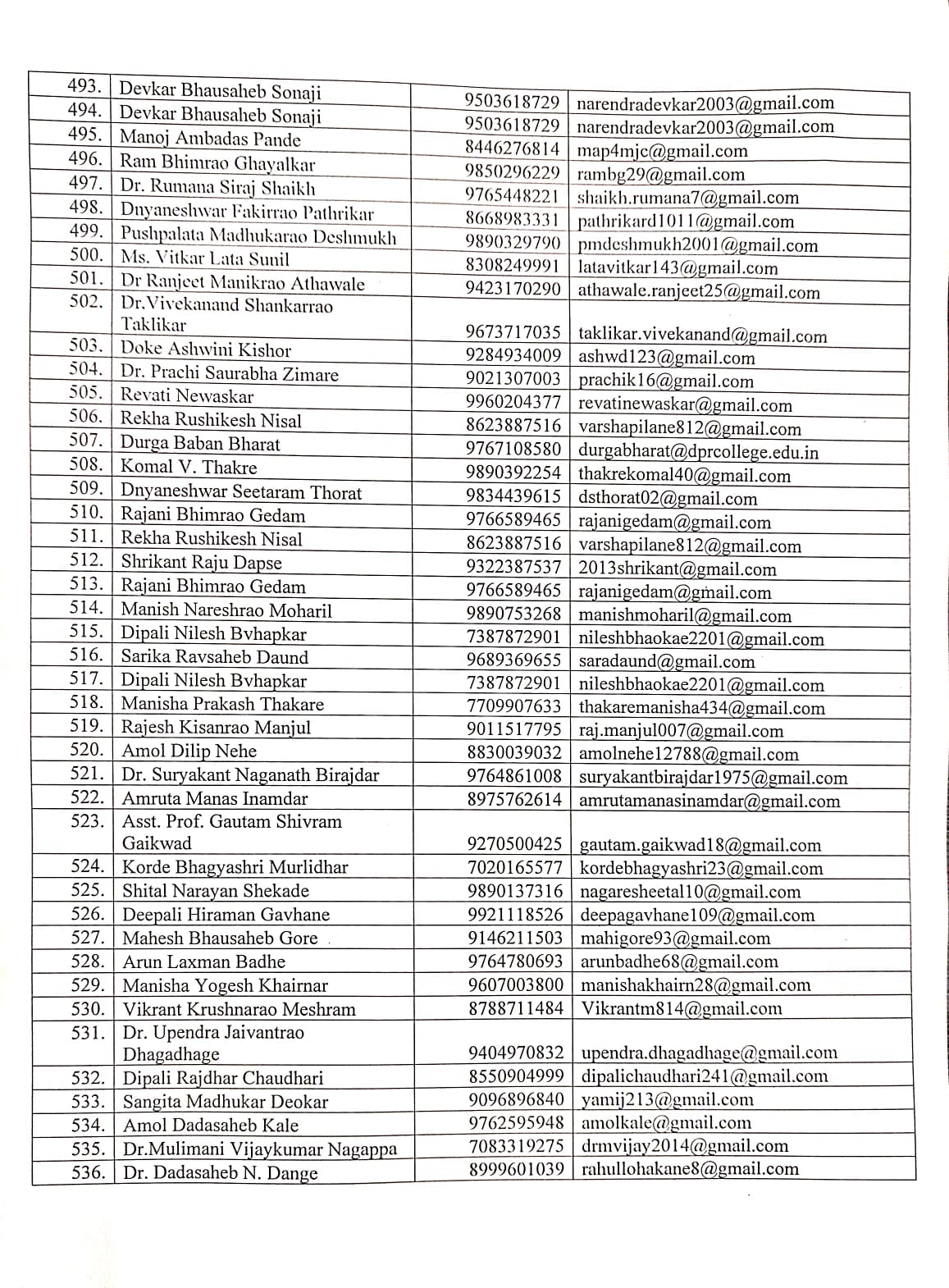 |
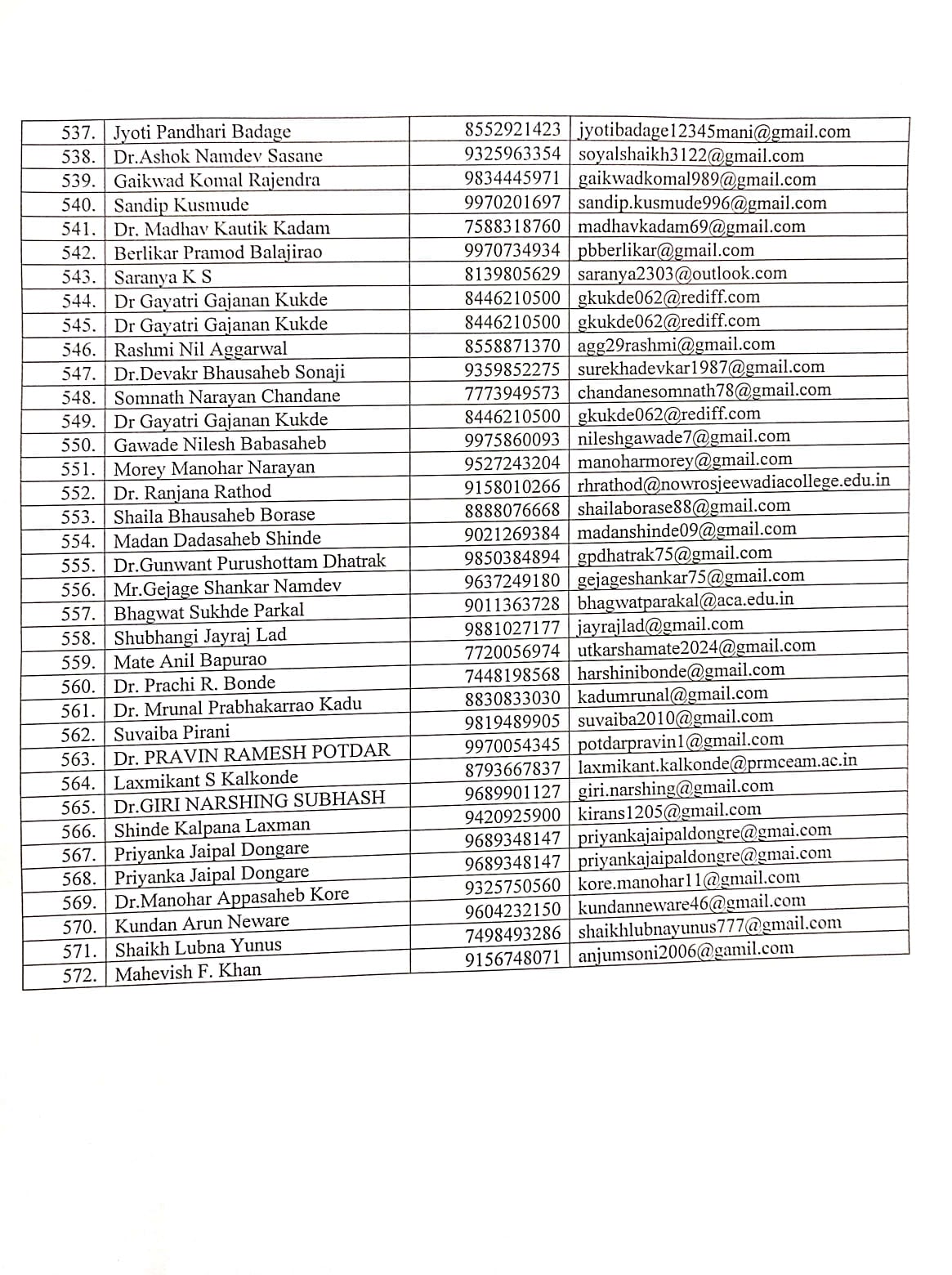 |